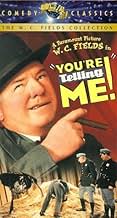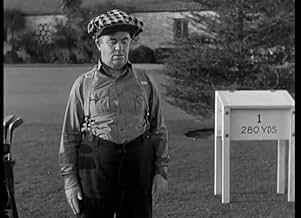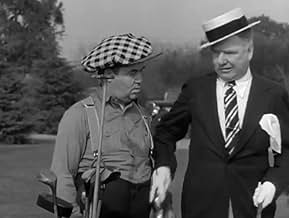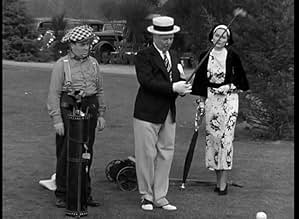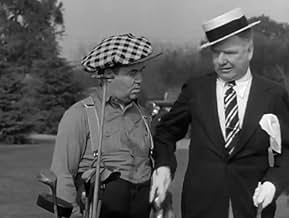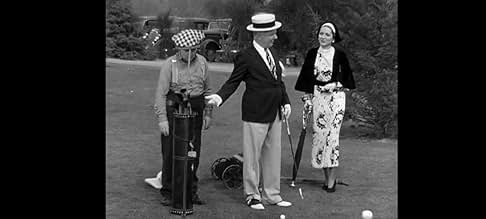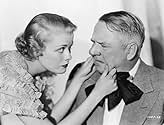AVALIAÇÃO DA IMDb
7,4/10
1,2 mil
SUA AVALIAÇÃO
Adicionar um enredo no seu idiomaA hard-drinking, socially-awkward inventor wrecks his daughter's chances of marriage into a rich family and bungles his own chances of success by selling one of his more practical inventions... Ler tudoA hard-drinking, socially-awkward inventor wrecks his daughter's chances of marriage into a rich family and bungles his own chances of success by selling one of his more practical inventions.A hard-drinking, socially-awkward inventor wrecks his daughter's chances of marriage into a rich family and bungles his own chances of success by selling one of his more practical inventions.
- Direção
- Roteiristas
- Artistas
- Prêmios
- 1 vitória no total
Buster Crabbe
- Bob Murchison
- (as Larry 'Buster' Crabbe)
Dell Henderson
- Mayor
- (as Del Henderson)
Robert McKenzie
- Charlie Bogle
- (as Robert Mc Kenzie)
William Bailey
- Tire Company Executive
- (não creditado)
Eddie Baker
- First Motorcycle Cop
- (não creditado)
Dorothy Bay
- Mrs. Kendall
- (não creditado)
Harold Berquist
- Doorman
- (não creditado)
Don Brodie
- Waiter
- (não creditado)
Elise Cavanna
- Sarah Smith - Female Gossip
- (não creditado)
Avaliações em destaque
8tavm
W.C. Fields was one comedian from the movies' golden age that took me a while to like as a kid. The first time I remember laughing at him was when, in Fatal Glass of Beer, he keeps looking at the open window and saying, "And it ain't a fit night out for man nor beast!" after which snow would hit him in the face! You're Telling Me! has plenty of funny visual and verbal gems that keep the movie breezing along for little more than an hour. Among the highlights are the beginning when Mr. Fields, coming home drunk, encounters a curtain constantly along with his angry wife who keeps telling him to take off his hat and put down his shoes, his talking a princess on a train out of "suicide" after failing to attempt one himself (because of constant interruptions), his struggles with an ostrich he buys for his wife, and his golf game at the end that also gets delayed with various distractions especially from the caddy (Fields also did this routine on his talkie debut, The Golf Specialist). You're Telling Me! is one of Fields' classics that should be essential viewing for anyone wanting to be introduced to his work.
As the film opens, it's late at night and we see an inebriated W.C. Fields slowly making his way up the walkway to his front door; as he moves along, he staggers off the path and has an encounter with a tree limb that raises havoc with his straw hat and knocks it off, which gives Fields-- the all-time master of physical comedy-- a field upon which to ply his craft to the fullest. He makes the simple task of refitting chapeau to pate engagingly hilarious. And once he makes it into the house (shoes in hand, of course, but too late!-- the little woman is waiting for him), it's more of the same, beginning with an encounter with some draperies, this time. It's classic Fields schtick, and what a great way to kick off one of his lesser known, but vibrantly funny films, `You're Telling Me,' directed by Erle C. Kenton.
Pauline Bisbee (Joan Marsh) and Bob Murchison (Buster Crabbe) are in love, and want to be married; but there's a snag: The Bisbee house is located on the `wrong' side of the tracks, and the union is meeting strong resistance from Bob's mother, Mrs. Edward Quimby Murchison (Kathleen Howard), who is ever discerning of the Murchison's place in society. And Pauline's father, Sam (Fields), is of little help. An inveterate dreamer, Sam is an inventor, and though he knows it's only a matter of time before the world beats a path to his door, his time, unfortunately, has not yet come, which leaves him in the quagmire of anonymity, and his family still on the wrong side of the tracks.
All of that is about to change, however, because Sam has at last invented something that will assure him fortune and fame: A 1000% puncture-proof automobile tire. He has an appointment in the city with a tire company, and once they see his demonstration, he knows his future will be made, Pauline will be able to marry Bob, and all will be well.
Alas, the demonstration goes awry, and the hapless Sam, dejected, disgraced and alone, boards a train for home. He thinks it's the end; but on the train, he befriends a beautiful young woman, unaware that she is a foreign dignitary, the Princess Lescaboura (Adrienne Ames), currently on a goodwill tour of America. And it turns out to be an auspicious encounter, as Sam's kindness to her is about to be repaid in a way that will change his life forever.
This film is vintage W.C. Fields, featuring all of the trademark elements that make him (and his films) so endearing and enduring, even today: The sight gags, presented in that unique Fields' way; Fields as the underdog; the innate cynicism Fields honed into a veritable art form; Fields as the hen-pecked husband (a role he played often, and perfected in `It's A Gift,' made this same year-- 1934-- with Kathleen Howard as his wife); the witty retorts; and, of course, the genuine humor. In one respect, however, this film differs from most of his others, in that, as Sam, Fields displays a gentler side of his usually caustic nature. The acerbity is present, to be sure, but toned down; and Sam, perhaps more than any character Fields ever created, is genuinely likable.
As Bob Murchison, Buster Crabbe's performance leaves something to be desired, but that charismatic spark that would make him a matinee idol later in the Sci-fi serials `Flash Gordon' and `Buck Rogers,' and later in numerous `Billy the Kid' and `Billy Carson' westerns, is evident, and most importantly, he does well enough to set the stage for the antics of the film's star.
In only her second film, Kathleen Howard is a delight in the role of Mrs. Murchison, who is something of a prototype for many who would come later in other films, such as Eulalie Mackechnie Shinn of Meredith Willson's `The Music Man.' As Bob's domineering mother, she affects an aloofness that strikes just the right chord and makes her the perfect foil for the down-to-earth Sam Bisbee.
The supporting cast includes Louise Carter (Bessie Bisbee), Tammany Young (Caddy), Dell Henderson (Mayor), James B. `Pop' Kenton (Doc Beebe), Robert McKenzie (Charlie Bogle), Nora Cecil (Mrs. Price), George Irving (Mr. Robins) and Frederick Sullivan (Mr. Edward Quimby Murchison). Comparatively short (at 66 minutes), `You're Telling Me' is nevertheless something of a minor classic and pure Fields from start to finish. Thoroughly enjoyable and highly entertaining, It even gives the inimitable W.C. a chance to perform a bit of his famous `golf' routine. A funny, and often downright hilarious film, it's a showcase for one of cinema's premiere funny men, and in the end, more than anything else, one thing is certain: It's going to make you laugh. And that's the magic of the movies. I rate this one 9/10.
Pauline Bisbee (Joan Marsh) and Bob Murchison (Buster Crabbe) are in love, and want to be married; but there's a snag: The Bisbee house is located on the `wrong' side of the tracks, and the union is meeting strong resistance from Bob's mother, Mrs. Edward Quimby Murchison (Kathleen Howard), who is ever discerning of the Murchison's place in society. And Pauline's father, Sam (Fields), is of little help. An inveterate dreamer, Sam is an inventor, and though he knows it's only a matter of time before the world beats a path to his door, his time, unfortunately, has not yet come, which leaves him in the quagmire of anonymity, and his family still on the wrong side of the tracks.
All of that is about to change, however, because Sam has at last invented something that will assure him fortune and fame: A 1000% puncture-proof automobile tire. He has an appointment in the city with a tire company, and once they see his demonstration, he knows his future will be made, Pauline will be able to marry Bob, and all will be well.
Alas, the demonstration goes awry, and the hapless Sam, dejected, disgraced and alone, boards a train for home. He thinks it's the end; but on the train, he befriends a beautiful young woman, unaware that she is a foreign dignitary, the Princess Lescaboura (Adrienne Ames), currently on a goodwill tour of America. And it turns out to be an auspicious encounter, as Sam's kindness to her is about to be repaid in a way that will change his life forever.
This film is vintage W.C. Fields, featuring all of the trademark elements that make him (and his films) so endearing and enduring, even today: The sight gags, presented in that unique Fields' way; Fields as the underdog; the innate cynicism Fields honed into a veritable art form; Fields as the hen-pecked husband (a role he played often, and perfected in `It's A Gift,' made this same year-- 1934-- with Kathleen Howard as his wife); the witty retorts; and, of course, the genuine humor. In one respect, however, this film differs from most of his others, in that, as Sam, Fields displays a gentler side of his usually caustic nature. The acerbity is present, to be sure, but toned down; and Sam, perhaps more than any character Fields ever created, is genuinely likable.
As Bob Murchison, Buster Crabbe's performance leaves something to be desired, but that charismatic spark that would make him a matinee idol later in the Sci-fi serials `Flash Gordon' and `Buck Rogers,' and later in numerous `Billy the Kid' and `Billy Carson' westerns, is evident, and most importantly, he does well enough to set the stage for the antics of the film's star.
In only her second film, Kathleen Howard is a delight in the role of Mrs. Murchison, who is something of a prototype for many who would come later in other films, such as Eulalie Mackechnie Shinn of Meredith Willson's `The Music Man.' As Bob's domineering mother, she affects an aloofness that strikes just the right chord and makes her the perfect foil for the down-to-earth Sam Bisbee.
The supporting cast includes Louise Carter (Bessie Bisbee), Tammany Young (Caddy), Dell Henderson (Mayor), James B. `Pop' Kenton (Doc Beebe), Robert McKenzie (Charlie Bogle), Nora Cecil (Mrs. Price), George Irving (Mr. Robins) and Frederick Sullivan (Mr. Edward Quimby Murchison). Comparatively short (at 66 minutes), `You're Telling Me' is nevertheless something of a minor classic and pure Fields from start to finish. Thoroughly enjoyable and highly entertaining, It even gives the inimitable W.C. a chance to perform a bit of his famous `golf' routine. A funny, and often downright hilarious film, it's a showcase for one of cinema's premiere funny men, and in the end, more than anything else, one thing is certain: It's going to make you laugh. And that's the magic of the movies. I rate this one 9/10.
It's not often I'll thank a TV network, but Turner Classic Movies deserves heartfelt praise for broadcasting the entire Fields canon this May & June. YOU'RE TELLING ME! has many, many hilarious setpieces and throwaway bits of business - but you'd expect that from William Claude. What might surprise you is his delicate touch when pathos and tenderness are called for. The scene on the train where a despondent Fields, playing struggling eccentric inventor Sam Bisbee, accidentally meets a travelling Princess and tries to talk her out of 'suicide' (she had no such plans...but HE did, in a moment of despair) nearly brought this cynic to tears. It's not the heavy drama of the scene that affects the viewer so much as Fields' flawless playing of it. Plot contrivance it may be, but the easy, simple grace he brings to his line readings - the small, almost imperceptible shadings of wistfulness and regret in his voice, facial expressions & body language - all give testimony to this brilliant comic actor's mastery of craft, and his ability to draw water from the well of his own loneliness. Don't misunderstand; this is a side-splitting comedy. Much of the comedy is purely visual; all of it is unforgettable. But NEVER short-count WC Fields, or confuse him with an impressionist's caricature. Where other clowns tried their damndest to make you laugh till it hurts, Fields knew his gift was to create a character forever set-upon and assaulted by a blithe, uncaring parade determined to pass him by - a man who hurt till all you can do is laugh. Well, you'll laugh all through this 65-minute model of timing and economy; but watching Fields trampled underfoot again, warily rising to his feet with no higher expectation than a brief, sweet respite before his next inevitable shellacking from the fates and furies, you might just get an idea of why they called him 'The Great Man'. Much obliged, TCM.
10gregvw
This is one of the funniest films I've ever seen. Fields stars as Sam Bisbee a liquor-loving inventor who is trying to sell his puncture-proof (actually bullet-proof) tires to a major corporation. The son of a wealthy socialite proposes to Bisbee's daughter, only to be foiled by his mother when she encounters the uncouth Bisbee. On top of ruining his daughter's potential marriage, Sam also loses his car and several other inventions and mistakenly shoots the tires of a police car. The resolution involves a princess, Bisbee running down mainstreet with an ostrich on a rope, and a classic Fieldsian attempt at hitting a golf ball (which somehow results in a pie getting stuck to his hat.)
Do yourself a favor and see this movie!
Do yourself a favor and see this movie!
YOU'RE TELLING ME? (Paramount, 1934), directed by Erle C. Kenton, adapted from the story "Mr. Bisbee's Princess" by Julian Street, stars W.C Fields in his first domestic comedy since his silent comedy days of the late 1920s, reprising the character he originated from SO'S YOUR OLD MAN (Paramount, 1926). In spite of some script alterations, ranging from the invention of unbreakable glass to punctured proof tires, the basic premise remains the same. As in most comedies displaying Fields the family man, he's a lovable father worshiped by an offspring, in many instances, his daughter, looked upon by his spouse as a miserable failure, until success comes his way for his wife to have a new outlook on him. While she may still appear to have lost interest in him, she hasn't lost her pride by elevating herself to the level of her husband's rewarded success.
For the basic plot: Samuel Bisbee (WC Fields) lives in a small town of Crystal Springs. He supports his wife, Abigail, (Louise Carter), formerly Abigail Warren of the acclaimed Warrens of Virginia, and daughter, Pauline (Joan Marsh). Sam is an optometrist who spends most of his time working on several inventions at the shop. In between his intervals, he gets together with the neighboring husbands enjoying themselves drinking liquor. Aside from domestic problems involving Pauline's love for Bob Murchinson (Larry "Buster" Crabbe), son of society snob, Mrs. Edward Quimby Murchinson (Kathleen Howard), who disapproves of their relationship, especially after meeting her father. As everything seems to fail, Bisbee gets a registered letter from the National Tire Company asking for a demonstration of his latest invention, a punctured-proof tire. Things go wrong when his automobile, equipped with the punctured proof tires, parked in a non-parking zone to be towed during Bisbee's absence and substituted by the same make and model police car. Bisbee demonstrates the puncture proof tire to Mr. Robbins (George Irving) by shooting at them, only to witness tires going flat one at a time. Foiled again, Sam takes the next train home. Depressed, he decides to commit suicide, leaving his wife a note before swallowing some iodine, but instead, mistakes a woman passenger (Adrienne Ames) with a bottle of iodine with intentions of doing the same thing, thus "saving her life." Unaware that she's the famed Princess Lescaboura traveling incognito, he befriends her in her cabin, telling her his life story. Seen together by town gossips, rumor spreads about Bisbee's secret rendezvous on the train with an attractive woman. Finding Bisbee in need of encouragement, the princess helps him by coming to Crystal Springs, surprising, in fact, shocking the people of her sole purpose being to visit her "good friend," Samuel Bisbee, the one who "saved her life in the war."
A domestic comedy with its ups and downs, is definitely a WC Fields showcase from his unsuccessful to successful inventions; attempt to make up with his wife a giant Ostrich as a gift; to his climatic golf game lifted from one of Fields' many comic supplements originated on the stage, and duplicated in his comedy short, THE GOLF SPECIALIST (1930), this time with Tammany Young as the caddy stooge.
Kathleen Howard, famous for pairing as Fields' shrewish wife in both IT'S A GIFT (1934) and THE MAN OF THE FLYING TRAPEZE (1935), makes her initial appearance with him here. Louise Carter, a physically fragile looking woman, as the domineering wife, shows her lack of love for her husband when in one instant, is told by the visiting Princess, "I think you're the luckiest woman in the world." Mrs. Bisbee asks, "Is my husband dead?" "Buster" Crabbe, the famed swimming champion who scored success as Kaspa, the lion man, in KING OF THE JUNGLE (Paramount, 1933), and the chaptered serial, TARZAN THE FEARLESS (1933), ranks one of the stronger supporting names ever credited in a Fields comedy, yet his secondary role, gives him little to do, especially during the climatic golf game sequence where all he does is look on approvingly and smile. Joan Marsh as Bisbee's daughter, with hairstyle and features resembling Mary Carlisle, another Paramount starlet, has her limitations as well. Adrienne Ames as the princess, addressed as "Marie" by Bisbee, comes off better, as the sympathetic character who helps Sam Bisbee regain his confidence and respect from his family and townspeople. She's the one who uses the titled catch phrase, "You're telling me?"
YOU'RE TELLING ME? is a sort after Fields comedy. Once unavailable for viewing, it finally surfaced on commercial television in the late 1970s, which, by then, was a totally unfamiliar Fields comedy. Prior to that, when TV Guide had the title "You're Telling Me" listed, it turned out to be not the Fields edition but a Universal 1942 comedy bearing the same title starring Hugh Herbert. The Fields edition gained its recognition when presented, along with other Fields/ Paramount comedies, on American Movie Classics (1992-93). Out of circulation for nearly a decade, YOU'RE TELLING ME?, which has since been distributed on video cassette, received some further exposure on Turner Classic Movies (2001-2002).
As with themes to many Frank Capra comedies about the common man, "No man is a failure ... when he has friends," this goes for Samuel Bisbee who finds the true friendship with Princess Lescaboura, proving to him that he, in true essence, is not a failure at all. YOU'RE TELLING ME? is an enjoyable 66 minutes,not only displaying Fields' comedic talents as inventor who's no Thomas Edison, but a family man with a sympathetic nature, even when sneaking in drink or two. You're telling me? (**1/2)
For the basic plot: Samuel Bisbee (WC Fields) lives in a small town of Crystal Springs. He supports his wife, Abigail, (Louise Carter), formerly Abigail Warren of the acclaimed Warrens of Virginia, and daughter, Pauline (Joan Marsh). Sam is an optometrist who spends most of his time working on several inventions at the shop. In between his intervals, he gets together with the neighboring husbands enjoying themselves drinking liquor. Aside from domestic problems involving Pauline's love for Bob Murchinson (Larry "Buster" Crabbe), son of society snob, Mrs. Edward Quimby Murchinson (Kathleen Howard), who disapproves of their relationship, especially after meeting her father. As everything seems to fail, Bisbee gets a registered letter from the National Tire Company asking for a demonstration of his latest invention, a punctured-proof tire. Things go wrong when his automobile, equipped with the punctured proof tires, parked in a non-parking zone to be towed during Bisbee's absence and substituted by the same make and model police car. Bisbee demonstrates the puncture proof tire to Mr. Robbins (George Irving) by shooting at them, only to witness tires going flat one at a time. Foiled again, Sam takes the next train home. Depressed, he decides to commit suicide, leaving his wife a note before swallowing some iodine, but instead, mistakes a woman passenger (Adrienne Ames) with a bottle of iodine with intentions of doing the same thing, thus "saving her life." Unaware that she's the famed Princess Lescaboura traveling incognito, he befriends her in her cabin, telling her his life story. Seen together by town gossips, rumor spreads about Bisbee's secret rendezvous on the train with an attractive woman. Finding Bisbee in need of encouragement, the princess helps him by coming to Crystal Springs, surprising, in fact, shocking the people of her sole purpose being to visit her "good friend," Samuel Bisbee, the one who "saved her life in the war."
A domestic comedy with its ups and downs, is definitely a WC Fields showcase from his unsuccessful to successful inventions; attempt to make up with his wife a giant Ostrich as a gift; to his climatic golf game lifted from one of Fields' many comic supplements originated on the stage, and duplicated in his comedy short, THE GOLF SPECIALIST (1930), this time with Tammany Young as the caddy stooge.
Kathleen Howard, famous for pairing as Fields' shrewish wife in both IT'S A GIFT (1934) and THE MAN OF THE FLYING TRAPEZE (1935), makes her initial appearance with him here. Louise Carter, a physically fragile looking woman, as the domineering wife, shows her lack of love for her husband when in one instant, is told by the visiting Princess, "I think you're the luckiest woman in the world." Mrs. Bisbee asks, "Is my husband dead?" "Buster" Crabbe, the famed swimming champion who scored success as Kaspa, the lion man, in KING OF THE JUNGLE (Paramount, 1933), and the chaptered serial, TARZAN THE FEARLESS (1933), ranks one of the stronger supporting names ever credited in a Fields comedy, yet his secondary role, gives him little to do, especially during the climatic golf game sequence where all he does is look on approvingly and smile. Joan Marsh as Bisbee's daughter, with hairstyle and features resembling Mary Carlisle, another Paramount starlet, has her limitations as well. Adrienne Ames as the princess, addressed as "Marie" by Bisbee, comes off better, as the sympathetic character who helps Sam Bisbee regain his confidence and respect from his family and townspeople. She's the one who uses the titled catch phrase, "You're telling me?"
YOU'RE TELLING ME? is a sort after Fields comedy. Once unavailable for viewing, it finally surfaced on commercial television in the late 1970s, which, by then, was a totally unfamiliar Fields comedy. Prior to that, when TV Guide had the title "You're Telling Me" listed, it turned out to be not the Fields edition but a Universal 1942 comedy bearing the same title starring Hugh Herbert. The Fields edition gained its recognition when presented, along with other Fields/ Paramount comedies, on American Movie Classics (1992-93). Out of circulation for nearly a decade, YOU'RE TELLING ME?, which has since been distributed on video cassette, received some further exposure on Turner Classic Movies (2001-2002).
As with themes to many Frank Capra comedies about the common man, "No man is a failure ... when he has friends," this goes for Samuel Bisbee who finds the true friendship with Princess Lescaboura, proving to him that he, in true essence, is not a failure at all. YOU'RE TELLING ME? is an enjoyable 66 minutes,not only displaying Fields' comedic talents as inventor who's no Thomas Edison, but a family man with a sympathetic nature, even when sneaking in drink or two. You're telling me? (**1/2)
Você sabia?
- CuriosidadesFields' character Bisbee describes a possible scenario involving catching burglars in the basement and drinking with them, a scenario that would be played out in a later film, Man on the Flying Trapeze (1935).
- Erros de gravaçãoRosita is brushing Princess Lescaboura's nails and after Rosita says, "But you must.", the Princess' hands are under the table.
- Citações
Sam Bisbee: It's a funny ol' world... Man's lucky if he gets out of it alive.
Principais escolhas
Faça login para avaliar e ver a lista de recomendações personalizadas
- How long is You're Telling Me!?Fornecido pela Alexa
Detalhes
- Tempo de duração1 hora 6 minutos
- Cor
- Proporção
- 1.37 : 1
Contribua para esta página
Sugerir uma alteração ou adicionar conteúdo ausente

Principal brecha
By what name was Apesar dos Pesares (1934) officially released in Canada in English?
Responda
